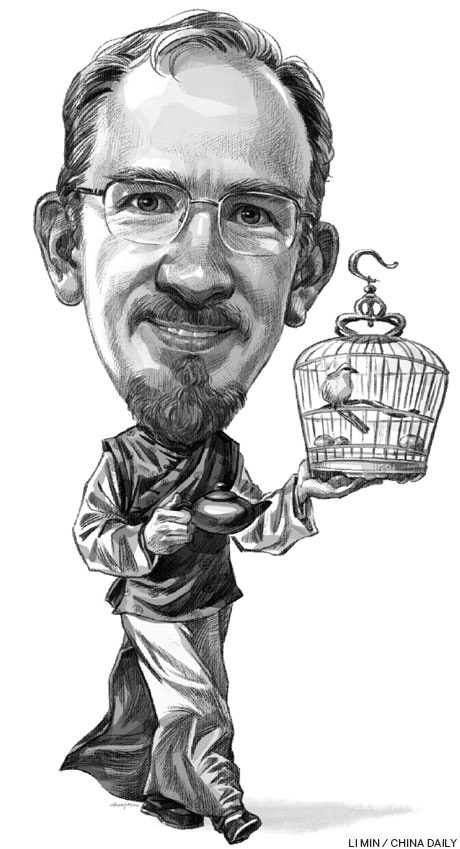當(dāng)前位置: Language Tips> 雙語(yǔ)新聞
From hot water to hugs, 50 ways I've become more Chinese
分享到
It's more than just perfecting your chopsticks technique or struggling to learn Mandarin. Living in China - indeed, living anywhere abroad - changes you, as Matt Prichard reports.
以為練習(xí)使用筷子,努力學(xué)習(xí)普通話就是在中國(guó)生活的全部?那你可就錯(cuò)了。在馬特·普里查德看來(lái),中國(guó)生活會(huì)給你帶來(lái)許多改變——其實(shí),我們只要生活在國(guó)外就一定會(huì)發(fā)生變化。
I have now lived in China longer than it took to get my bachelor's degree. While no one is going to confuse me with any of my Chinese colleagues or friends, the experience has definitely made a difference in my daily routine and how I see the world. In my estimation, it has been a positive change.
我在中國(guó)呆的時(shí)間比在大學(xué)呆的時(shí)間還長(zhǎng)。當(dāng)我和中國(guó)同事、朋友在一起的時(shí)候,外人總能一眼認(rèn)出我是外國(guó)人,但在中國(guó)生活的這么些年確實(shí)影響了我的日常生活乃至世界觀。而且在我看來(lái),這些都是積極影響。
Some ingrained laowai (foreigner) habits are hard to break: I still sometimes forget to ask if I should take off my shoes when visiting another person's home. Yet, it was a revelation to make a list of 50 ways I have become more Chinese, and in particular, more of a Beijinger, in ways big and small:
有一些根深蒂固的“老外”習(xí)慣仍然難以改正:比如去拜訪別人家時(shí),有時(shí)我還是忘了問(wèn)需不需要換鞋子。但當(dāng)我列出了自己越來(lái)越像中國(guó)人,尤其是像北京人的大大小小五十個(gè)行為方式后,連自己都覺(jué)得出乎意料。

從飲用熱水到不再見(jiàn)人就擁抱,我在下面五十個(gè)細(xì)節(jié)上越來(lái)越像中國(guó)人:
1. While mystified the first time I was served a glass of hot water, I now like it, especially in winter.
第一次接到一杯熱水時(shí)我困惑不解,而如今我卻愛(ài)上了熱水,尤其在冬天。
2. I have an English name and a distinct Chinese name (Ma Wen Tao) that's not just a phonetic version of the former.
我有一個(gè)英文名和一個(gè)發(fā)音完全不同的中文名(馬文濤),中文名不是英文名的音譯。
3. I know the Chinese zodiac sign I was born under (rooster).
我知道自己的生肖是雞。
Also, I:
此外,我還:
4. Don't hug acquaintances anymore.
不再見(jiàn)人就擁抱。
5. Smile automatically when I see a small child, and may ask a baby's age or name.
看到小孩就情不自禁地微笑,可能還會(huì)問(wèn)寶寶多大了,叫什么名字。
6. Have a new favorite breakfast food: jian bing, Shandong style, a crunchy, eggy, spicy crepe of goodness.
早餐有了新的最愛(ài):山東煎餅,一種加蛋的香辣脆餅,好吃到爆。
7. Go to Wumart more than Wal-Mart, and love the lively atmosphere.
去物美超市比去沃爾瑪去得更勤,喜歡那里的生氣勃勃。
8. Have a son who speaks good Chinese - my youngest studied Mandarin in college, including a summer in Chengdu.
有個(gè)中文說(shuō)得很溜的兒子——我最小的孩子在大學(xué)里學(xué)過(guò)普通話,還在成都待過(guò)一夏天。
9. Have a new favorite snack: chuanr, or as my wife calls it, meat-on-a-stick.
零食也有了新的最愛(ài):烤串兒,或者用我妻子的話來(lái)說(shuō),串燒肉。
10. Seldom worry about personal safety, even walking in big cities at night.
不怎么擔(dān)心個(gè)人安全了,晚上也敢在大城市里行動(dòng)了。
11. Keep a large metal carafe on my desk for hot water for the day's tea.
桌上準(zhǔn)備了一個(gè)不銹鋼水壺,用來(lái)放白天泡茶的熱水。
12. Have friendly relationship with Jing Dong delivery guy.
和京東快遞小哥的關(guān)系挺不錯(cuò)的。
13. Have a Chinese keyboard on my phone.
手機(jī)上設(shè)置了中文輸入法。
14. Will eat jellyfish - reminds me of cole slaw.
開(kāi)始吃海蜇,味道像菜絲沙拉。
15. No longer have coffee on balcony - that's where I hang wet clothes.
再也不在陽(yáng)臺(tái)上喝咖啡了——那可是我晾衣服的地方。
16. Politely cover my mouth with one hand while using a toothpick.
用牙簽時(shí)會(huì)禮貌地用手擋住嘴巴。
17. Grocery shop using my bicycle.
騎自行車去買(mǎi)菜。
18. Have to remember to tip when I'm traveling abroad.
出國(guó)旅行時(shí)必須提醒自己要給小費(fèi)。
19. Wonder why public spaces there look so empty.
看到空蕩蕩的公共場(chǎng)所會(huì)很奇怪。
20. Pack a jar with a hot beverage from home for the office.
出門(mén)上班時(shí)會(huì)裝上一罐熱飲。
21. Consider vendors' prices only a reference point for haggling.
知道商家的標(biāo)價(jià)只是為砍價(jià)做參考而已。
22. Use the China UnionPay card: I never leave home without it.
用中國(guó)銀聯(lián)卡:出門(mén)必將隨身攜帶。
23. Love tearjerker Chinese history dramas on TV.
酷愛(ài)電視上催淚的中國(guó)古裝劇。
24. Am amazed by Western actors who speak really good Mandarin.
聽(tīng)到西方演員操一口標(biāo)準(zhǔn)的普通話會(huì)十分嘆服。
25. Make fun of Americanized "Chinese food" back home.
回美國(guó)時(shí)會(huì)打趣美版的“中華菜肴”。
26. Keep transit card on me at all times.
隨身攜帶一卡通。
27. Check air pollution conditions several times a day.
一天能查上好幾次空氣污染情況。
28. Keep mask in my coat pocket, humidifier by my bed.
外套口袋里備有口罩,床邊備有空氣加濕器。
29. Calculate, automatically, yuan equivalents of dollar prices in my head.
自動(dòng)心算將人民幣換算成美元。
30. Am amazed at how much stuff costs in Western countries.
為西方國(guó)家的高物價(jià)所震驚。
31. Check WeChat throughout day; make phone calls on WeChat.
一整天時(shí)不時(shí)就檢查微信,用微信語(yǔ)音聊天。
32. Think ganbei (dry cup) when someone proposes a toast.
別人祝酒時(shí)我就想著干杯。
33. Have a pet cat with a Chinese name, Meimei (Little Sister).
養(yǎng)了一只中文名叫“妹妹”的寵物貓。
34. Love candied crabapples.
喜歡上了蜜餞。
35. Put my contact information for emails in English and Chinese.
電子郵件的通訊錄設(shè)為中英對(duì)照。
36. Measure wintertime by when Beijing's centralized radiator heating system comes on and shuts off.
根據(jù)北京中央供暖系統(tǒng)的開(kāi)放和關(guān)閉來(lái)判斷冬季的來(lái)去。
37. Keep supply of red envelopes for cash gifts on appropriate occasions.
常年備有紅包,在必要的場(chǎng)合贈(zèng)送禮金。
38. Go to a hospital for routine healthcare.
定期去醫(yī)院做體檢。
39. Have Moutai baijiu (white spirits) firewater in a cabinet at home.
家里壁柜中收藏了濃烈的茅臺(tái)白酒。
40. Live in a divided household: Wife and I are split by that infamous rivalry, Shanghai vs Beijing.
夫妻兩地分居:兩個(gè)人分別生活在勢(shì)不兩立的上海和北京。
41. Have no problem with squat toilets, which actually are more natural.
用得慣蹲式廁所,其實(shí)這種排便姿勢(shì)更自然。
42. Surprised and dismayed by how little the world knows about China.
世界對(duì)中國(guó)知之甚少,這讓我很驚訝也很沮喪。
43. Get up in wee hours to watch important sporting events outside Asia.
凌晨爬起來(lái)看亞洲外的重大體育賽事。
44. Think not only of time zones when phoning abroad, but also the International Dateline.
打國(guó)際長(zhǎng)途時(shí)除了要考慮時(shí)差,還要考慮國(guó)際日期變更線。
45. Try to balance Mandarin-speakers and English-speakers at social gatherings.
社交聚會(huì)上,在說(shuō)漢語(yǔ)和說(shuō)英語(yǔ)的人之間巧妙周旋。
46. Understand much better the importance of friends to a happy life.
比以前更明白友情對(duì)幸福生活的重要性。
47. Celebrate two New Year's days and two Valentine's days.
每年慶祝兩個(gè)新年,兩個(gè)情人節(jié)。
48. Stare briefly at anyone who doesn't appear to be Chinese on buses, subways or airplanes.
在公交車、地鐵和飛機(jī)上,看到誰(shuí)不像是中國(guó)人就會(huì)瞧上一眼。
49. Read celebrity news of Jackie Chan and Fan Bingbing, ignore Kardashians.
看成龍和范冰冰的八卦新聞,而不再理會(huì)卡戴珊姐妹。
50. Gave up Netflix for Youku.
不再看奈飛,喜歡上了優(yōu)酷。
Vocabulary
carafe: 飲料瓶
haggle: 討價(jià)還價(jià)
wee hours: 凌晨
英文來(lái)源:中國(guó)日?qǐng)?bào)
作者:Matt Prichard
譯者:趙瀟逸
審校&編輯:丹妮
上一篇 : 老外給總理提建議
下一篇 : 彼得兔頭像榮登英國(guó)硬幣
分享到
關(guān)注和訂閱


口語(yǔ)
關(guān)于我們 | 聯(lián)系方式 | 招聘信息
電話:8610-84883645
傳真:8610-84883500
Email: languagetips@chinadaily.com.cn